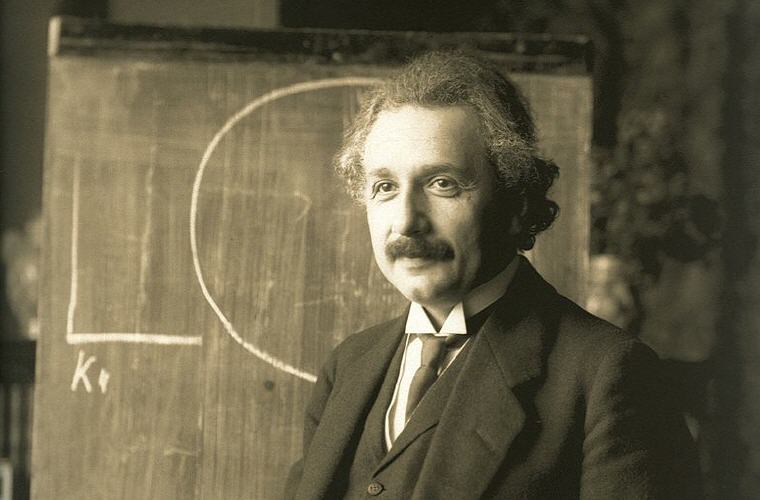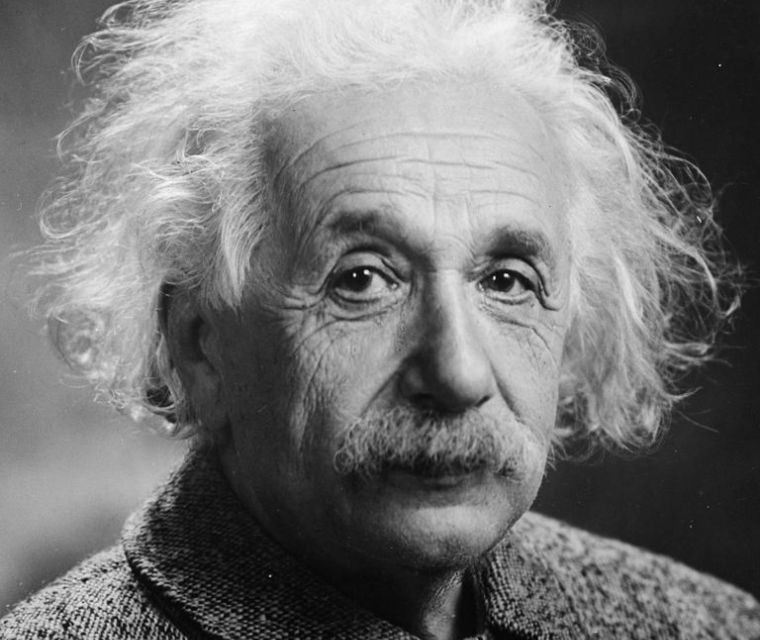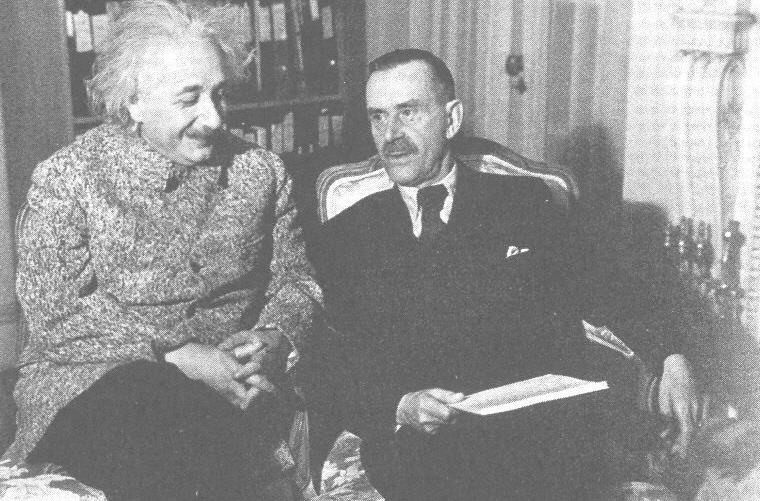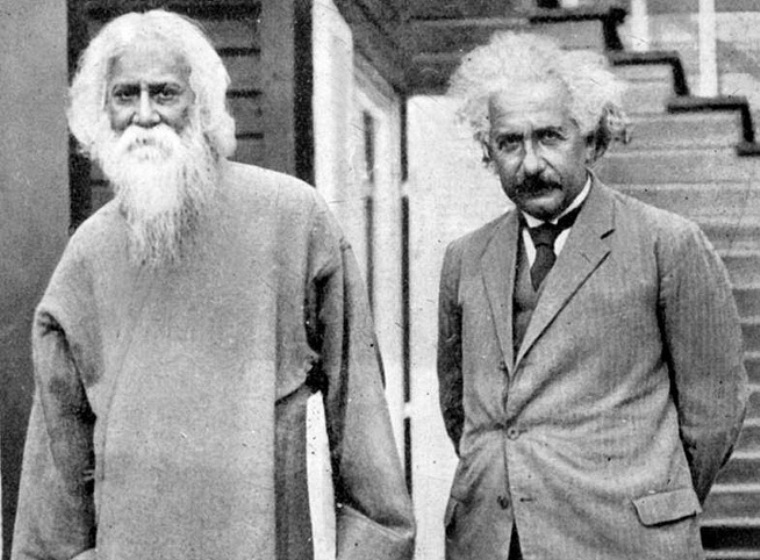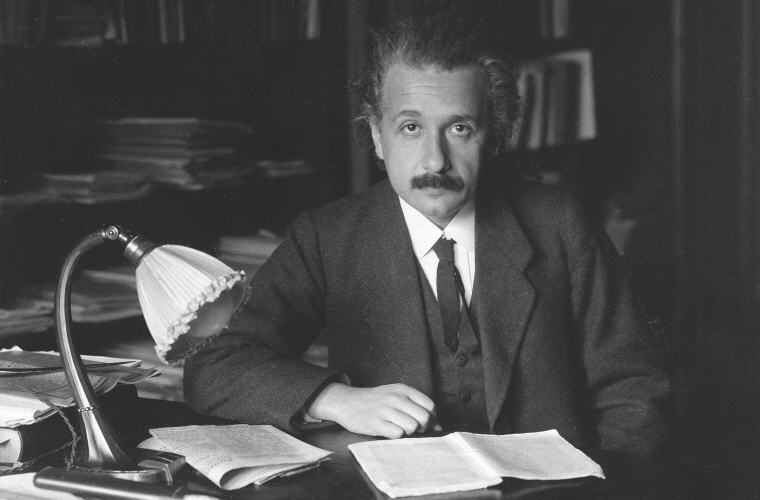Albert Einstein Quotes on Love and Sayings
#1 Albert Einstein: The Human Side, 1979, p.56
1. Falling in love is not at all the most stupid thing that people do — but gravitation cannot be held responsible for it.
#2 Symposium on Structure of Enzymes and Proteins, 1956, p. 284
2. How on earth are you ever going to explain in terms of chemistry and physics so important a biological phenomenon as first love?
#3 Einstein and the Poet, 1983, p.87
3. To simplify the concept of relativity, I always use the following example: if you sit with a girl on a garden bench and the moon is shining, then for you the hour will be a minute. However, if you sit on a hot stove, the minute will be an hour.
______________________
Albert Einstein (14 March 1879 – 18 April 1955) was an ethnically Jewish, German-born, theoretical physicist of the 20th century who is best known for his theories of special relativity and general relativity. He also made important contributions to statistical mechanics, especially his treatment of Brownian motion, his resolution of the paradox of specific heats, and his connection of fluctuations and dissipation. Despite his reservations about its interpretation, Einstein also made contributions to quantum mechanics and, indirectly, quantum field theory, primarily through his theoretical studies of the photon.
Einstein published more than 300 scientific works and more than 150 non-scientific works. In 1999 Time magazine named him the Person of the Century, and in the words of a biographer, “to the scientifically literate and the public at large, Einstein is synonymous with genius.”
Albert Einstein Sayings
#1 The Literary Digest: Volume 107 on p. 29
1. “I never think of the future,” he said. “It comes soon enough.”
#2 The Collected Papers of Albert Einstein Vol. 1, 1987, Doc. 22
2. A happy man is too satisfied with the present to dwell too much on the future.
#3 Speech to students at the California Institute of Technology, in “Einstein Sees Lack in Applying Science”, The New York Times, 16 February 1931
3. Why does this magnificent applied science which saves work and makes life easier bring us so little happiness? The simple answer runs: Because we have not yet learned to make sensible use of it.
#4 In a letter to Otto Juliusburger, September 29, 1942
4. People like you and I, though mortal of course like everyone else, do not grow old no matter how long we live…[We] never cease to stand like curious children before the great mystery into which we were born.
#5-6 The World as I See It
5. My political ideal is democracy. Let every man be respected as an individual and no man idolized.
6. The life of the individual has meaning only in so far as it aids in making the life of every living thing nobler and more beautiful. Life is sacred — that is to say, it is the supreme value, to which all other values are subordinate. (Also quoted in The Ultimate Quotable Einstein)
#7 As quoted by Virgil Henshaw in Albert Einstein: Philosopher Scientist, 1949
7. Never do anything against conscience even if the state demands it.
#8 Old Man’s Advice to Youth: ‘Never Lose a Holy Curiosity.’, LIFE Magazine, 2 May 1955, p. 64
8. The important thing is not to stop questioning. Curiosity has its own reason for existence. One cannot help but be in awe when he contemplates the mysteries of eternity, of life, of the marvelous structure of reality. It is enough if one tries merely to comprehend a little of this mystery each day.
#9 In answer to a question asked by the editors of Youth, a journal of Young Israel of Williamsburg, NY. Quoted in the New York Times, June 20, 1932, pg. 17
9. Only a life lived for others is a life worthwhile.
#10 Alice Calaprice: The Quotable Einstein
10. A human being is a part of the whole, called by us “Universe,” a part limited in time and space. He experiences himself, his thoughts and feelings as something separate from the rest—a kind of optical delusion of his consciousness. The striving to free oneself from this delusion is the one issue of true religion. Not to nourish it but to try to overcome it is the way to reach the attainable measure of peace of mind. (Letter transcript and photograph)
#11 From a speech to the New History Society, 14 December 1930, reprinted in “Militant Pacifism” in Cosmic Religion, 1931
11. Peace cannot be kept by force. It can only be achieved by understanding. You cannot subjugate a nation forcibly unless you wipe out every man, woman, and child. Unless you wish to use such drastic measures, you must find a way of settling your disputes without resort to arms.
#12 Albert Einstein, the Human Side: New Glimpses from His Archives, Letter (30 July 1947)
12. Nothing truly valuable arises from ambition or from a mere sense of duty; it stems rather from love and devotion towards men and towards objective things.
#13 Statement on the occasion of Gandhi’s 70th birthday, 1939, published in Out of My Later Years (1950)
13. Generations to come, it may well be, will scarce believe that such a man as this one ever in flesh and blood walked upon this Earth.
#14 Atomic Education Urged by Einstein, New York Times, 25 May 1946
14. A new type of thinking is essential if mankind is to survive and move toward higher levels.
#15 Speech made in honor of Thomas Mann in January 1939, Quoted in Einstein Lived Here by Abraham Pais, 1994, p. 214
15. Weakness of attitude becomes weakness of character; it becomes lack of power to act with courage proportionate to danger. All this must lead to the destruction of our intellectual life unless the danger summons up strong personalities able to fill the lukewarm and discouraged with new strength and resolution.
#16-18 Mein Weltbild (My World-view), 1931
16. How strange is the lot of us mortals! Each of us is here for a brief sojourn; for what purpose he knows not, though he sometimes thinks he senses it. But without deeper reflection one knows from daily life that one exists for other people — first of all for those upon whose smiles and well-being our own happiness is wholly dependent, and then for the many, unknown to us, to whose destinies we are bound by the ties of sympathy. A hundred times every day I remind myself that my inner and outer life are based on the labors of other men, living and dead, and that I must exert myself in order to give in the same measure as I have received and am still receiving …
17. I have never looked upon ease and happiness as ends in themselves — this critical basis I call the ideal of a pigsty. The ideals that have lighted my way, and time after time have given me new courage to face life cheerfully, have been kindness, beauty, and truth.
18. He who joyfully marches to music in rank and file has already earned my contempt. He has been given a large brain by mistake, since for him the spinal cord would fully suffice. This disgrace to civilisation should be done away with at once. Heroism at command, senseless brutality, deplorable love-of-country stance, how violently I hate all this, how despicable and ignoble war is; I would rather be torn to shreds than be part of so base an action! It is my conviction that killing under the cloak of war is nothing but an act of murder.
#19 Interview with George Sylvester Viereck, January 1931
19. I am not only a pacifist but a militant pacifist. I am willing to fight for peace. Nothing will end war unless the people themselves refuse to go to war.
#20 The Real Problem Is in the Hearts of Men, The New York Times Magazine, June 23, 1946
20. It is easier to denature plutonium than it is to denature the evil spirit of man
#21 LIFE magazine, 2 May 1955
21. Try to become not a man of success, but try rather to become a man of value.
#22 Religion and Science, 1930
22. Science has therefore been charged with undermining morality, but the charge is unjust. A man’s ethical behavior should be based effectually on sympathy, education, and social ties and needs; no religious basis is necessary. Man would indeed be in a poor way if he had to be restrained by fear of punishment and hopes of reward after death.
#23 Albert Einstein: The Human Side, 1979, Letter to the minister of a church in Brooklyn, 20 November 1950
23. The most important human endeavor is the striving for morality in our actions. Our inner balance and even our very existence depend on it. Only morality in our actions can give beauty and dignity to life.
#24 Interview with Alfred Werner, Liberal Judaism 16 (April-May 1949)
24. I do not know how the Third World War will be fought, but I can tell you what they will use in the Fourth — rocks!
#25 Essay to Leo Baeck, 1953
25. Hail to the man who went through life always helping others, knowing no fear, and to whom aggressiveness and resentment are alien. Such is the stuff of which the great moral leaders are made.
#26 Science and Religion, 1941
26. Science without religion is lame, religion without science is blind.
#27 Letter to his son Eduard (5 February 1930), as quoted in Walter Isaacson, Einstein: His Life and Universe, 2007, p. 367
27. Life is like riding a bicycle. To keep your balance you must keep moving.
#28-29 Viereck interview, 1929
28. I am enough of an artist to draw freely upon my imagination. Imagination is more important than knowledge. Knowledge is limited. Imagination encircles the world.
29. I believe in intuitions and inspirations. I sometimes feel that I am right. I do not know that I am.
#30 Ernst Straus in Einstein: A Centenary Volume by A.P. French, 1980, p. 32
30. If you want to live a happy life, tie it to a goal, not to people or objects.
#31 What Life Means to Einstein: An Interview by George Sylvester Viereck The Saturday Evening Post, 26 October 1929
31. I do not believe in race as such. Race is a fraud. All modern people are the conglomeration of so many ethnic mixtures that no pure race remains.
#32 Attributed to Einstein by his colleague Léopold Infeld in his book Quest: An Autobiography, 1949, p. 291
32. I speak to everyone in the same way, whether he is the garbage man or the president of the university.
#33-34 Einstein and the Poet, 1983
33. Try not to become a man of success, but a man of value. Look around at how people want to get more out of life than they put in. A man of value will give more than he receives. Be creative, but make sure that what you create is not a curse for mankind.
34. If we want to improve the world we cannot do it with scientific knowledge but with ideals. Confucius, Buddha, Jesus and Gandhi have done more for humanity than science has done. We must begin with the heart of man—with his conscience—and the values of conscience can only be manifested by selfless service to mankind.
#35 Letter to Morris Raphael Cohen, 19 March 1940
35. Great spirits have always encountered violent opposition from mediocre minds. The mediocre mind is incapable of understanding the man who refuses to bow blindly to conventional prejudices and chooses instead to express his opinions courageously and honestly.
#36 Said to Samuel J Woolf, Berlin, Summer 1929
36. If A is success in life, then A = x + y + z. Work is x, play is y and z is keeping your mouth shut.
#37 Moral Decay, 1937; Out of My Later Years, 1950
37. All religions, arts and sciences are branches of the same tree. All these aspirations are directed toward ennobling man’s life, lifting it from the sphere of mere physical existence and leading the individual towards freedom. It is no mere chance that our older universities developed from clerical schools. Both churches and universities — insofar as they live up to their true function — serve the ennoblement of the individual. They seek to fulfill this great task by spreading moral and cultural understanding, renouncing the use of brute force.
#38 Edison Test: New York Times, 18 May 1921
38. The value of a college education is not the learning of many facts but the training of the mind to think.
#39 Einstein and Religion: Physics and Theology (1999), Max Jammer
39. The Wonder of nature does not become smaller because one cannot measure it by the standards of human moral and human aims. (Letter, 7 August 1941, discussing responses to his essay “Science and Religion” (1941), p. 97)
#40 Einstein’s tribute to Pablo Casals, 30 March 1953, in Conversations with Casals, 1957
40. … the world is in greater peril from those who tolerate or encourage evil than from those who actually commit it.
#41 Ich habe keine besondere Begabung, sondern bin nur leidenschaftlich neugierig. Letter to Carl Seelig, 11 March 1952
41. I have no special talents. I am only passionately curious.
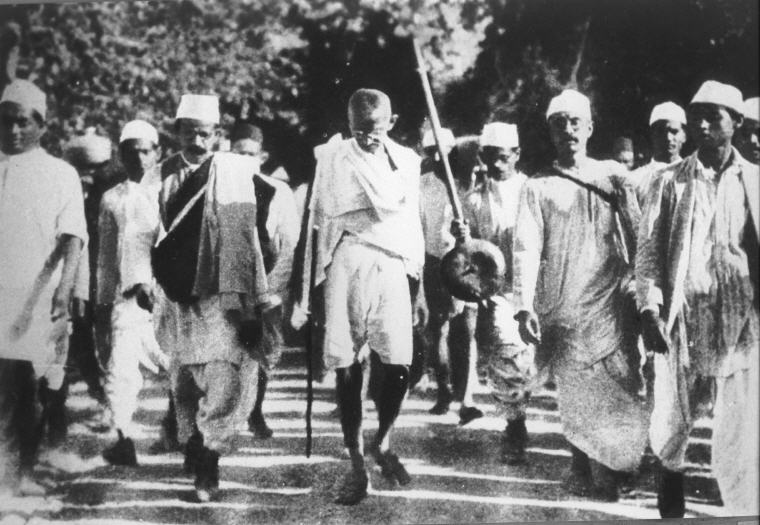
Gandhi during the Salt March, March 1930, Photo credit: WikiImages
#42 United Nations radio interview recorded in Einstein’s study, Princeton, New Jersey (1950)
42. Taken on the whole, I would believe that Gandhi’s views were the most enlightened of all the political men in our time. We should strive to do things in his spirit… not to use violence in fighting for our cause, but by non-participation in what we believe is evil.
#43 Letter to his mother Pauline Einstein, 28 April 1910, Einstein: His Life and Universe by Walter Isaacson
43. To dwell on the things that depress or anger us does not help in overcoming them. One must knock them down alone.
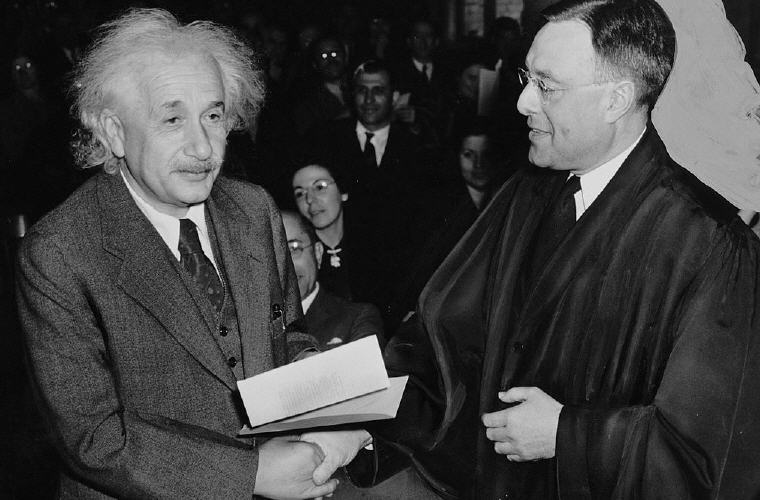
Albert Einstein receiving from Judge Phillip Forman his certificate of American citizenship, 1 October 1940, Photo credit: Wikimedia
Unsourced Quotes attributed to Albert Einstein
1. When you trip over love, it is easy to get up. But when you fall in love, it is impossible to stand again.
2. It’s not that I’m so smart, it’s just that I stay with problems longer.
3. Creativity is intelligence having fun.
4. Most people say that is it is the intellect which makes a great scientist. They are wrong: it is character.
5. The value of a man should be seen in what he gives and not in what he is able to receive.
______________________
Quotes misattributed to Albert Einstein
#1 William Bruce Cameron, Informal Sociology: A Casual Introduction to Sociological Thinking, 1963 [S]
1. …not everything that can be counted counts, and not everything that counts can be counted.
______________________
Books on Albert Einstein
1. Albert Einstein, The Human Side
2. Albert Einstein: Life of Genius
3. Albert Einstein’s Vision
Search for more books on Albert Einstein; New & used.
